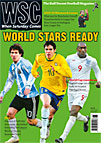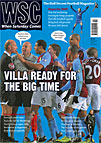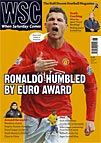 Cameron Carter explores how the concept of a Big Four is no longer enough
Cameron Carter explores how the concept of a Big Four is no longer enough
Consensus is a hard thing to come by. How, for instance, can we begin to arrive at agreement on the true source of the riots around England when the Football Focus team cannot even decide how many teams make up the Big Four? It used to be easier when it was just Manchester United, Chelsea, Arsenal and Liverpool. They were our Tesco, Sainsbury’s, Asda and Morrisons. There was no ambiguity at this time, no indecision. But the Premier League, like the world outside, has become a more complex place.
At the start of Football Focus on August 13 the concept of a “top six” was given its first airing, presumably constructed by BBC imagineers from the previous top four plus Manchester City and Spurs, while later in the same programme Eric Cantona was asked how he thought the “top five might finish”. There was still time before the end for Patrick Vieira to question how Wolves would do this season against the “top four or five”.
This matter had not been cleared up by the following Saturday, when Rafa Benítez considered how Everton would compete with the “top six”. It seems unfair that Everton have to face up to two more top clubs – that is, four more top games – than Wolves this season. One solution, albeit in an already crowded fixture list, is a pre-season mini-league featuring the nominal Big Six, to decide which teams are entitled to be formally named as the Big Four.
Otherwise, the worst case scenario here is that the Big Four expands incrementally, as more overseas investors buy into Premier League Sleeping Giants, until we have a ‘”Big 11″ by the end of the decade. At the point that numbers in the elite pool are greater than those outside it, we should all go down to the sea and wait for the world to be cleansed with fire.
For those of us awaiting the annual glory that is Lineker’s Marvellous Line, there was a credit-crunch, own-brand disappointment this year. Generally, before the theme music of the first Match of the Day of the new season, Gary stands before us in a glossy black shirt and, with dancing eyes, unleashes an adrenalin shot in the form of a carefully sculpted sentence prepared for him by a team of resting novelists.
Barry Davies started the big curtain-raiser soundbite trend with his Rupert Brooke desecration: “Stands the clock at ten-to-three/and is there football still to see?” Since then, twinkly Des Lynam, followed in turn by the lad Lineker, made a point of letting us know that they, like ordinary people everywhere, were simply treading water all summer until a thrilling new football season began.
This time, however, Gary was seated, not standing, and his eyes before he vocalised spoke of a terrible new maturity, learned possibly from accidental exposure to non-sports-based world news on his satellite television. All he said was “It’s been an awfully long summer” before introducing his sidekicks and the games as if it were any old Saturday. The absence of knowingly familiar expectancy-building in this welcome was somehow more disheartening than all the other cuts so far imposed on the UK’s population since the general election. It is surely but a short step from excising unnecessary opening-day vivaciousness in our flagship terrestrial football programme to banning all forms of dance, theatre and social dieting as unpatriotic fripperies.
Dan Walker’s mania for dragging the Football Focus cameras around dressing rooms continues apace. On the opening morning of the season, to demonstrate possession of the Access All Areas wristbands, he swanned into the Brighton dressing room where he was rewarded with the sight of 13 Brighton players seated around the bench studiously reading the match programme. You might think the point of going backstage is to show a fly-on-the-wall slice of life, to give your viewership a rare glimpse of the daily lives of the men they only otherwise get to see on the pitch, on television or, very rarely, in the flesh, flushed with refreshment and demanding that the manager of the country club sets up the karaoke.
But no, Dan stole behind the scenes to discover a carefully stage-managed tableau of young men with heads bowed wonderingly over a difficult text, not dissimilar in composition to Rembrandt’s Anatomy Lesson of Dr Nicolaes Tulp. It was a lovely image, but surely with Robbie Savage in the same room, there would more naturally be towel-flicking and banter containing sexual swear words? A bit of advice, young Walker – if you are going to barge in on somebody, make sure they are unprepared.
From WSC 296 October 2011



